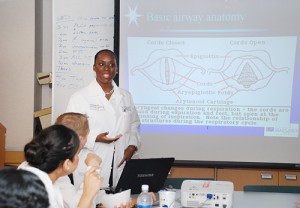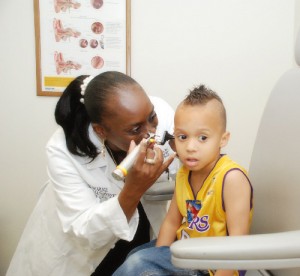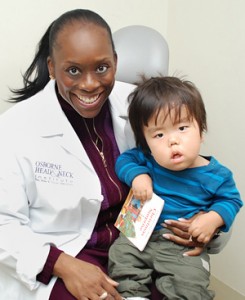- New Sublingual Allergy Tablets - October 31, 2014
- Ground-breaking New Treatment Option for Sleep Apnea - September 27, 2014
- Allergies versus Viruses in Children - September 27, 2014
- “Dog Dust” Protects Children from Allergies - September 27, 2014
- Nasal Saline Irrigation - August 8, 2014
- Doctor, I am Allergic to Dust. What Can I do? - July 31, 2014
- Infants Exposed to Dust Mites Less Likely to Develop Allergies - June 23, 2014
- How to Treat a Young Child’s Cough - December 17, 2013
- Many Parents are Unaware That Their Children Are at Risk for Noise Induced Hearing Loss - December 9, 2013
- Is it a Cold or an Ear Infection? - December 9, 2013
 It is no longer rare to hear that a child suffers from a peanut allergy. The story of 13-year old Natalie Giorgi, who died after going into anaphylactic shock after contact with peanut butter, is a tragic example of this. Her reaction was severe, and was triggered by a bite that she promptly spit out. However, this minute exposure was enough to cause anaphylaxis and her death. With peanut allergy on the rise (with a 3 fold increase in incidence in the past decade alone), what do we know about this common health condition?
It is no longer rare to hear that a child suffers from a peanut allergy. The story of 13-year old Natalie Giorgi, who died after going into anaphylactic shock after contact with peanut butter, is a tragic example of this. Her reaction was severe, and was triggered by a bite that she promptly spit out. However, this minute exposure was enough to cause anaphylaxis and her death. With peanut allergy on the rise (with a 3 fold increase in incidence in the past decade alone), what do we know about this common health condition?
What causes peanut allergies?
It is not currently known what causes peanut allergies. There are many theories, including linking allergies to breastfeeding, maternal peanut ingestion, soy milk, and the hygiene hypothesis but none have been proven. The hygiene hypothesis suggests that the increasing cleanliness of our environment (i.e., Purell, overprescription of antibiotics, antibiotic-treated food, etc) lessens the body’s exposure to real pathogens such as viruses and bacteria. This may prevent a child’s immune system from developing normally and may explain allergies’ and autoimmune conditions’ increasing prevalence.
Regardless, until a cause is determined, parents and patients need to be vigilant.

What are symptoms of a peanut allergy?
The first time a child is exposed to peanuts, the reaction may be mild and may include swelling of the lips and face, runny nose, or a rash. Every subsequent exposure is more severe and anaphylaxis is not uncommon. Symptoms of an allergy include:
- Hives/rash on the skin
- Swelling of lips/tongue
- Vomiting and diarrhea
- Asthma/wheezing
- Anaphylaxis – this is a severe allergic reaction in which the tissues of the breathing passageways swell to the point where breathing is obstructed. The blood pressure may also drop. This may occur within minutes of ingestion of the allergen. Death may result from anaphylactic shock.
How is an allergy diagnosed?
Most children are first brought to attention when they suffer an allergic reaction. Usually after consuming a peanut or other allergic food (such as eggs, fish/seafood, soy, etc), the child will develop a rash or swelling of their lips or tongue. They may also develop nausea and vomiting, diarrhea, or other gastrointestinal symptoms. Their lips and tongue may also itch.
At this point, it is highly likely the child has suffered a food-borne allergy. It is advisable to see a pediatric otolaryngologist, pediatrician, or pediatric allergist. Testing will be done to determine what the child is allergic too.
It is often very helpful for the parent to keep a food diary immediately upon noticing the symptoms. They should note what the child ate in the last 24 hours and continue to record what they eat and any reactions that occur until their visit with the doctor.
How can allergies be treated?
Unfortunately, there is no cure for peanut allergy.
Avoidance is the most important step. This is critical and often life-saving. However, as in the above case, this is not always possible or sufficient. Even though the child spit out the peanut butter-laden treat, the small dose she did consume was enough to trigger an anaphylactic reaction
 It is crucial for the child, caregiver, and school to have an Epi-Pen at all times. Epi-pens are life-saving devices that allow a child suffering from anaphylactic shock to be injected with epinephrine. Epinephrine will reverse some of the anaphylactic effects until emergency services are at the scene. The parents and child should be trained in how and when to use the device and one should be kept with and near the child at all times. Back-up devices are also critical. Parents often keep Epi-pens in all of the following locations:
It is crucial for the child, caregiver, and school to have an Epi-Pen at all times. Epi-pens are life-saving devices that allow a child suffering from anaphylactic shock to be injected with epinephrine. Epinephrine will reverse some of the anaphylactic effects until emergency services are at the scene. The parents and child should be trained in how and when to use the device and one should be kept with and near the child at all times. Back-up devices are also critical. Parents often keep Epi-pens in all of the following locations:
- The child’s backpack (exceptions should be made to school policies regarding a child’s access to medications for this life-saving drug)
- The parents’ car(s)
- The child’s home(s) with all caregivers (including babysitters) educated about how to use the device
- The parent’s purse/bag
- Camp
- During air travel
Your pediatric otolaryngologist can provide you with more information about this and instruct you on how to use this device.
Some children do outgrow their allergies so it is important to maintain a relationship with your doctor to follow your child’s allergies.
To learn more about Dr. Belinda Mantle or allergy evaluation and treatment, please visit www.ohni.org.



